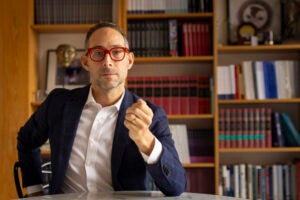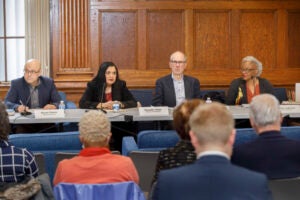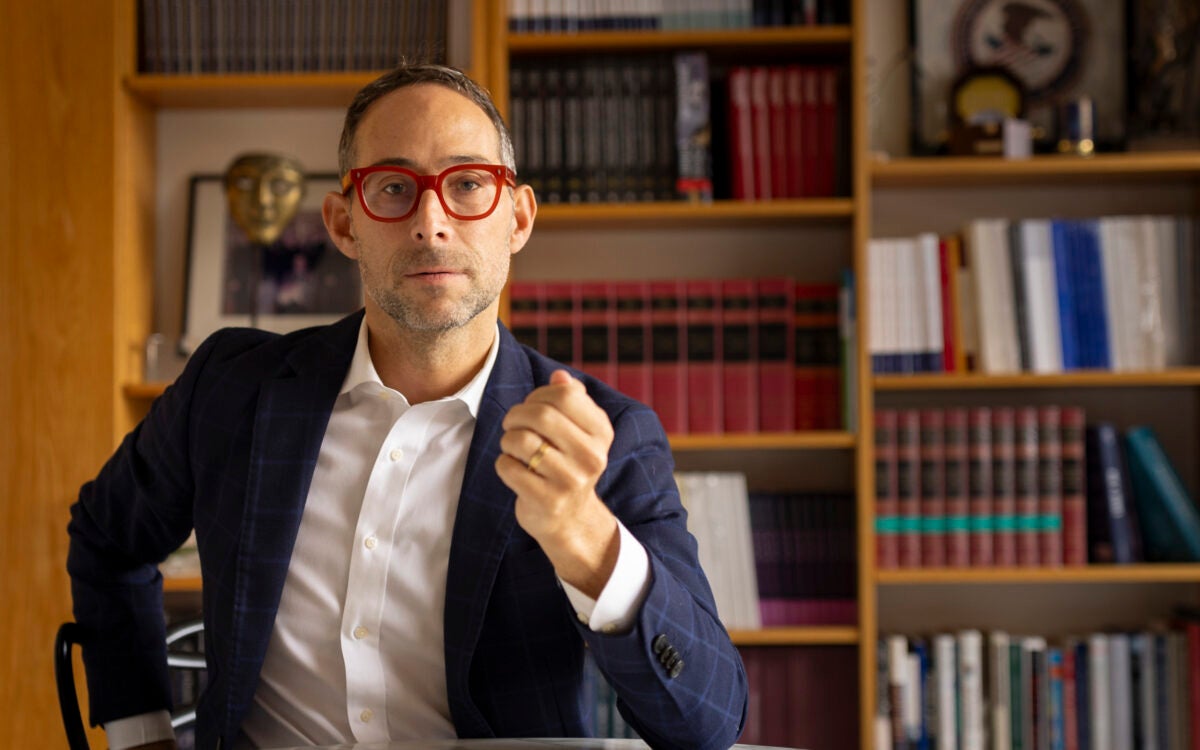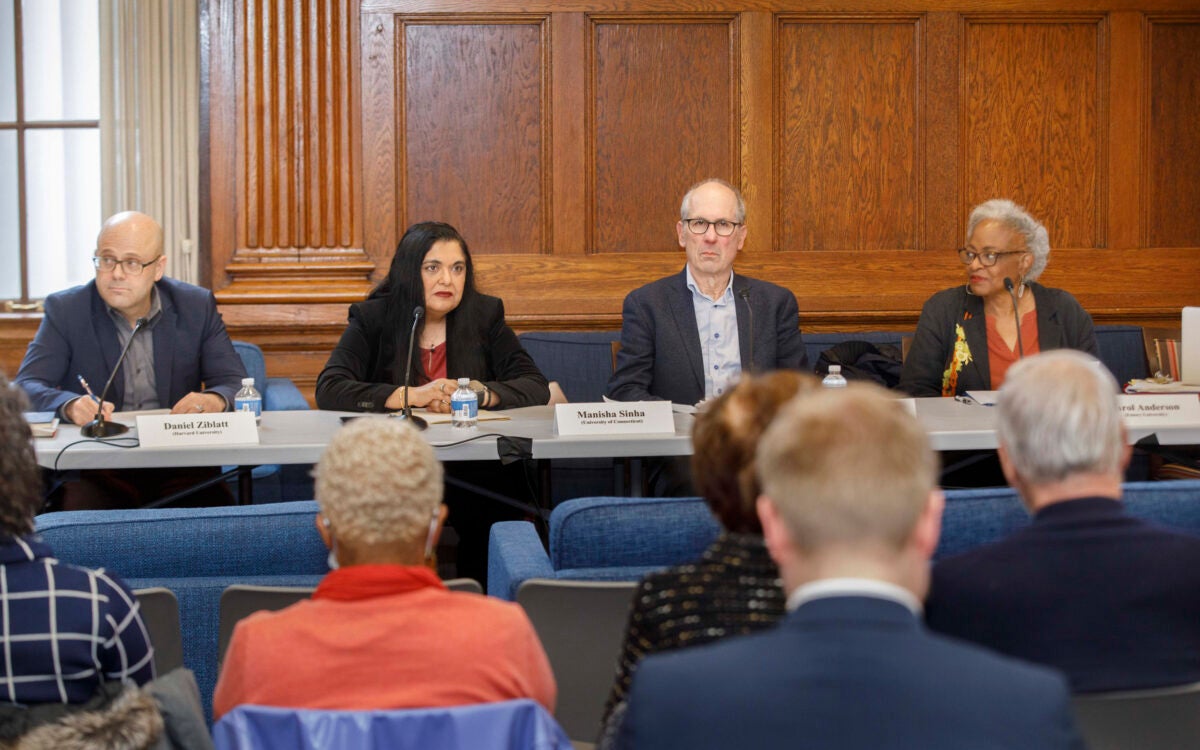Precocious pundit Alexander Burns is off to D.C.
While still an undergraduate, Alexander Burns already had an impact on political discourse in the United States.
Beginning in 2005, the history and literature concentrator has been a principal contributor to a political blog sponsored by the history magazine American Heritage. The job has allowed him to explore the pros and cons of contemporary issues, and to joust in print with some of the country’s most prestigious historians.
He has also written essays for the National Journal, a weekly magazine aimed at policymakers, members of Congress, think tanks, lobbyists, and other Washington insiders. And he has worked as a researcher for historian Doris Kearns Goodwin, helping her compile and analyze data for her forthcoming book on Theodore Roosevelt and William Howard Taft.
And while he has clearly achieved rookie status in the big leagues of political journalism, this precocious pundit can hardly be said to have ignored his fellow students. Since freshman year, Burns has been involved with the Harvard Kennedy School’s Institute of Politics (IOP), and, as an editor-in-chief of the Harvard Political Review (the IOP’s student-written political quarterly), he has been an important voice in political debate on campus.
How has Burns gained entrance to such respected forums at an age when most students are struggling for a decent mark on a term paper? According to Burns, it all started around the family dinner table.
It was there that his father, an elementary school principal, and his mother, an English professor at New York University (NYU), led passionate, informed discussions about contemporary events that eventually drew Burns in and transformed him into a budding news junkie.
“At a certain point I started to become independently aware of what was going on in the world. A lot of what was happening at that time was very exciting — the war in Kosovo, the contested election of 2000.
At Fieldston High School in the Riverdale section of the Bronx, Burns involved himself in student government. When he arrived at Harvard, it was the IOP that promised the best chance of getting up close and personal with the political process.
“At the IOP, I got to see that members of Congress and other leaders and officials are just people. That realization has been very important to me because it’s helped me to become less intimidated, and less reverent,” Burns said.
When it came time to look for a summer internship, Burns was eager to find a job that would allow him to put his realizations about the human side of government into writing, preferably published writing. A family friend suggested he send his clips to American Heritage magazine, which happened to be updating its Web site. The magazine welcomed him as a contributor to its blog, and since then he has written numerous pieces on such diverse subjects as the Electoral College, Jenna Bush’s wedding, the morality of torture, the execution of gays in Iran, and the impact of “Seinfeld” on popular culture. Whatever subject Burns tackles, he seldom fails to place it in a historical context that throws new and instructive light on its significance.
The confidence Burns displays in his writing did not come easily.
“When I first started contributing to the American Heritage blog, I did feel intimidated in some ways,” he said. “Most of the other contributors were older and more accomplished, and certainly more academically credentialed. A few of them were also very aggressive in criticizing any blog posts they found unconvincing.”
Burns’ strategy was to confine himself to areas in which he was fairly confident of his expertise. Where he found gaps in his knowledge base, a visit to the library or to one of his Harvard professors would help smooth them over.
“When I eventually did have run-ins with other blog contributors, I think I held my ground pretty well — because it was ground I had chosen myself,” Burns said.
His success as a political blogger also has a great deal to do with his moral perspective. Although his writing is often backed up by facts and statistics, Burns is no policy wonk. Being a history and literature concentrator has sensitized him to the moral and ethical issues embedded in today’s political issues.
“I am always struck by the fact that there are exciting dramas going on in the world right now,” he said.
Writing for The National Journal has been a different sort of experience, one that has given Burns the opportunity to explore subjects at greater length rather than respond to the opinions of others. Often these subjects have developed from brief news articles that suggested larger issues. For example, a small item about Congressman Marty Meehan’s (D-Mass.) decision to resign from the House of Representatives and take over UMass Lowell prompted Burns to write an article about politicians who have launched second careers as academic administrators.
An article in Newsweek calling America a “Dunce-Cap Nation,” based on the poor poll performance of randomly selected people called for, Burns believed, a more in-depth analysis. After extensive research, he produced an article showing that such polls often reach their dismal conclusions through confusing and misleading questions and that Americans are not as ignorant as the polls seemed to suggest.
Burns praises the editors of the National Review for their receptivity to ideas presented by interns and their willingness to work with young writers to help them develop and refine those ideas.
After Commencement, Burns will be moving to Washington, D.C., to work as a reporter for The Politico, the print and online political journal.
“I am very excited about this opportunity, which should allow me to pursue political journalism very seriously, and in the middle of an important election season,” he said.




